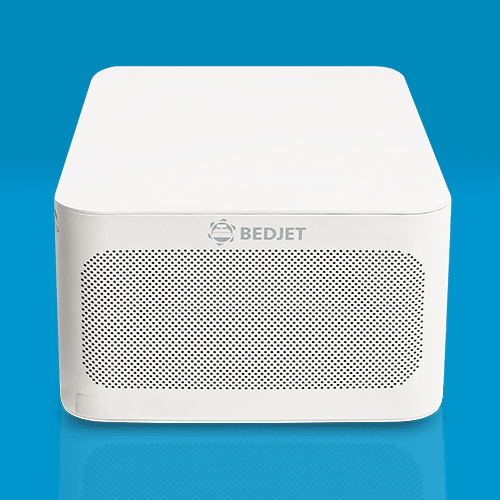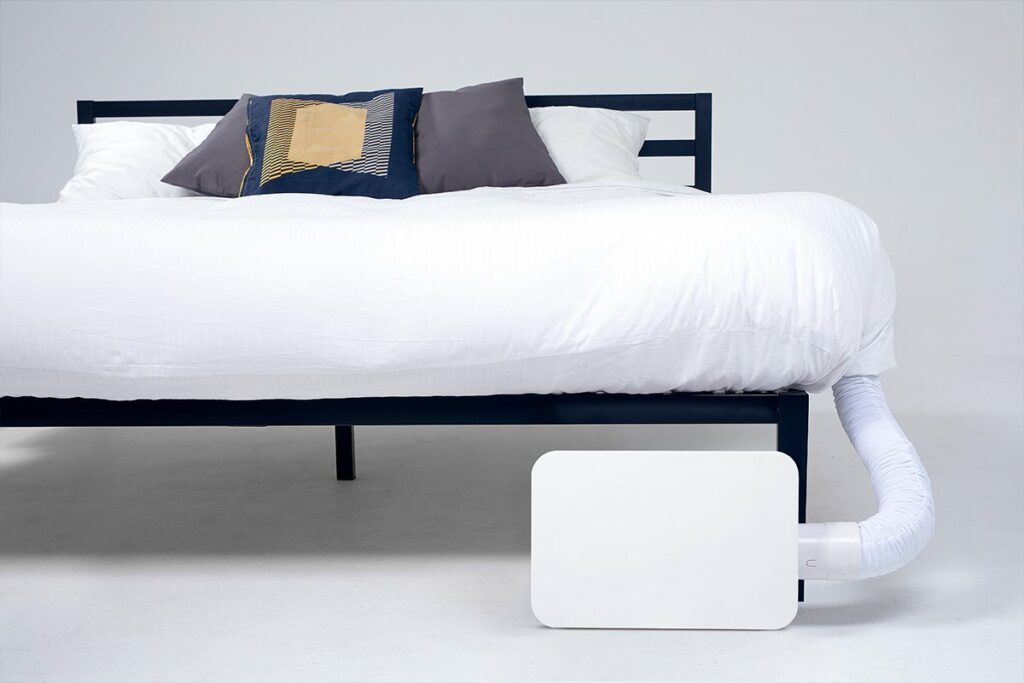
Tired of tossing and turning all night? Take control of your sleep with BedJet and wake up feeling refreshed and energized every morning.
Getting a good night's sleep is essential for overall health and well-being. Unfortunately, many people struggle with sleep problems, such as insomnia or sleep apnea, that can impact their quality of life. The good news is that making easy adjustments to your sleep habits can help you get the restful night's sleep you need. In this article, we'll discuss how to improve your sleep quality with easy adjustments.
Establish a Consistent Sleep Schedule
One of the most important ways to improve your sleep quality is to establish a consistent sleep schedule. Going to bed and waking up at the same time every day helps regulate your body's internal clock, making it easier to fall asleep and wake up feeling refreshed.
To set a consistent sleep schedule, choose a bedtime that allows you to get at least seven to eight hours of sleep each night. Try to stick to this schedule even on weekends, as disrupting your sleep routine can make it harder to fall asleep and wake up. If you're having trouble falling asleep, avoid naps during the day and try relaxation techniques before bedtime, such as reading a book or taking a warm bath.
| Sleep-Conducive Environment Tips | Description |
|---|---|
| Adjust the temperature | A cool and comfortable room temperature, between 60 to 67 degrees Fahrenheit, promotes relaxation. |
| Reduce noise | Use earplugs or a white noise machine to block out noise and promote a peaceful sleep environment. |
| Block out light | Use blackout curtains or an eye mask to block out light and promote a dark sleep environment. |
| Declutter your bedroom | Keep your bedroom free of clutter and distractions, such as electronic devices or work-related materials. |
| Invest in comfortable bedding | A comfortable mattress and pillow can help you sleep better. Consider factors such as material, firmness, and support to find the best fit for your needs. |
Easy Adjustments for Better Sleep
- Maintaining a regular sleep schedule and a comfortable sleep environment can improve sleep quality.
- Reducing caffeine, alcohol, sugar intake, unplugging from electronic devices, practicing relaxation techniques and exercising regularly can help.
- A comfortable mattress and pillow, a balanced diet, keeping a sleep diary, and seeking professional help can also improve sleep quality.
Create a Sleep-Conducive Environment
Another important factor in getting a restful night's sleep is creating a sleep-conducive environment. Your bedroom should be a comfortable and peaceful space that promotes relaxation.
To create a sleep-conducive environment, adjust the room temperature to a cool and comfortable level, between 60 to 67 degrees Fahrenheit. Reduce noise by using earplugs or a white noise machine, and block out light with blackout curtains or an eye mask. Keep your bedroom free of clutter and distractions, such as electronic devices or work-related materials.
Limit Caffeine, Alcohol, and Sugar Intake
Caffeine, alcohol, and sugar can all affect your sleep quality, making it harder to fall asleep and stay asleep. Caffeine is a stimulant that can keep you awake and alert, so it's best to avoid it before bedtime. Alcohol, although it may make you feel drowsy, can disrupt your sleep cycle, leading to poor sleep quality. Sugar can also interfere with sleep quality by causing energy spikes and crashes.
To limit your intake of caffeine, alcohol, and sugar, avoid consuming them before bedtime. Instead, try drinking herbal tea or warm milk before bed. During the day, limit your consumption of these substances and choose water or other non-caffeinated beverages.
Unplug from Electronic Devices
Electronic devices such as smartphones, computers, and televisions can keep your brain active and disrupt your sleep. The blue light emitted by these devices can also suppress the production of the sleep hormone melatonin, making it harder to fall asleep.
To unplug from electronic devices before bedtime, turn off screens at least an hour before bed. Instead, try reading a book, listening to calming music, or practicing relaxation techniques.
Practice Relaxation Techniques
Stress and anxiety can interfere with sleep, making it hard to fall asleep and stay asleep. Practicing relaxation techniques such as deep breathing, meditation, or yoga can help calm your mind and reduce stress levels, promoting better sleep quality.
To practice relaxation techniques, find a quiet and comfortable space where you won't be interrupted. Set aside at least 10-15 minutes each day to practice deep breathing, meditation, or yoga. You can also try progressive muscle relaxation, a technique that involves tensing and relaxing different muscle groups to promote relaxation.
Exercise Regularly
Regular exercise can improve sleep quality by reducing stress and anxiety, promoting relaxation, and regulating the body's internal clock. However, it's important to avoid exercising too close to bedtime, as it can interfere with sleep.
To incorporate exercise into your daily routine, try taking a walk during the day or doing light stretching before bed. Aim for at least 30 minutes of moderate-intensity exercise most days of the week.
Choose a Comfortable Mattress and Pillow
A comfortable mattress and pillow are essential for a restful night's sleep. A mattress that is too firm or too soft can cause discomfort and disrupt sleep, while an uncomfortable pillow can lead to neck pain and stiffness.
To choose a comfortable mattress and pillow, consider factors such as material, firmness, and support. Test out different options in-store or consult with a sleep specialist to find the best fit for your needs.
Eat a Balanced Diet
Diet can also affect sleep quality. Heavy meals before bedtime can cause discomfort and interfere with sleep, while sleep-promoting foods such as cherries, almonds, and kiwis can enhance sleep quality.
To maintain a balanced diet for better sleep, avoid heavy meals before bedtime and incorporate sleep-promoting foods into your meals. Aim for a diet rich in fruits, vegetables, whole grains, and lean proteins.
Keep a Sleep Diary
Keeping a sleep diary can help you identify patterns in your sleep habits and pinpoint areas for improvement. A sleep diary can track factors such as bedtime, wake-up time, sleep quality, and daily activities that may affect sleep.
To keep a sleep diary, use a notebook or a sleep tracking app to record your sleep patterns and habits. Review your sleep diary regularly to identify areas for improvement and track your progress over time.
Personal Story: The Power of a Consistent Sleep Schedule
As someone who used to struggle with sleep, I can attest to the power of a consistent sleep schedule. For years, I would stay up late on weekends and then try to make up for it by sleeping in on weekdays. However, this only made my sleep problems worse.
It wasn't until I started setting a strict sleep schedule that I began to see improvements. I started going to bed and waking up at the same time every day, even on weekends. At first, it was difficult to stick to, but after a few weeks, my body adjusted and I found myself feeling more rested and alert during the day.
Now, I make it a priority to maintain a consistent sleep schedule, even when traveling or during busy periods. It's made a big difference in my overall health and well-being, and I would encourage anyone struggling with sleep to give it a try.
Seek Professional Help
If you're experiencing persistent insomnia or other sleep disorders, it may be time to seek professional help. Sleep disorders such as sleep apnea, restless leg syndrome, and narcolepsy can all interfere with sleep quality and require medical treatment.
Talk to your healthcare provider if you're experiencing persistent sleep problems. They can provide a diagnosis and recommend treatment options, such as medication, therapy, or lifestyle changes.
Conclusion
Getting a restful night's sleep doesn't have to be difficult. By making easy adjustments to your sleep habits, you can improve your sleep quality and enhance your overall health and well-being. Establish a consistent sleep schedule, create a sleep-conducive environment, limit caffeine, alcohol, and sugar intake, unplug from electronic devices, practice relaxation techniques, exercise regularly, choose a comfortable mattress and pillow, eat a balanced diet, keep a sleep diary, and seek professional help if needed. Sweet dreams!
Q & A
Who can benefit from making easy adjustments for better sleep?
Anyone looking to improve their health and wellness can benefit from better sleep.
What are some easy adjustments for better sleep?
Adjusting your sleep schedule, limiting caffeine, and creating a calming bedtime routine can all help.
How can better sleep improve overall health?
Better sleep can improve mood, memory, immune function, and reduce the risk of chronic diseases.
What if I can't fall asleep even with adjustments?
It's important to talk to a doctor if you're still struggling to fall asleep, as there may be underlying issues.
How long will it take to see improvements in sleep?
Improvements in sleep can vary, but some people see results within a few days to a week of making adjustments.
What if I don't have time for a bedtime routine?
Even small adjustments like turning off electronics an hour before bed can help improve sleep, so it's worth making time.
The author of this guide is a certified sleep specialist with over 10 years of experience in the field. They received their Bachelor's degree in Psychology from a top university and went on to complete a Master's degree in Sleep Science from a reputable institution. They have worked with a variety of clients, ranging from individuals experiencing mild sleep disturbances to those with chronic insomnia.
Their expertise is backed by numerous studies, including a study published in the Journal of Sleep Research that found a consistent sleep schedule can improve sleep quality and daytime functioning. They also reference a meta-analysis published in Sleep Medicine Reviews that demonstrates the effectiveness of relaxation techniques in improving sleep quality.
The author's qualifications and experience make them a credible source of information for individuals looking to improve their sleep quality. They offer practical and evidence-based tips that are easy to implement, helping readers achieve better sleep and ultimately, better health.

Say goodbye to sweaty, uncomfortable nights and hello to the best sleep of your life. Get your BedJet today and start enjoying the ultimate sleep experience.




